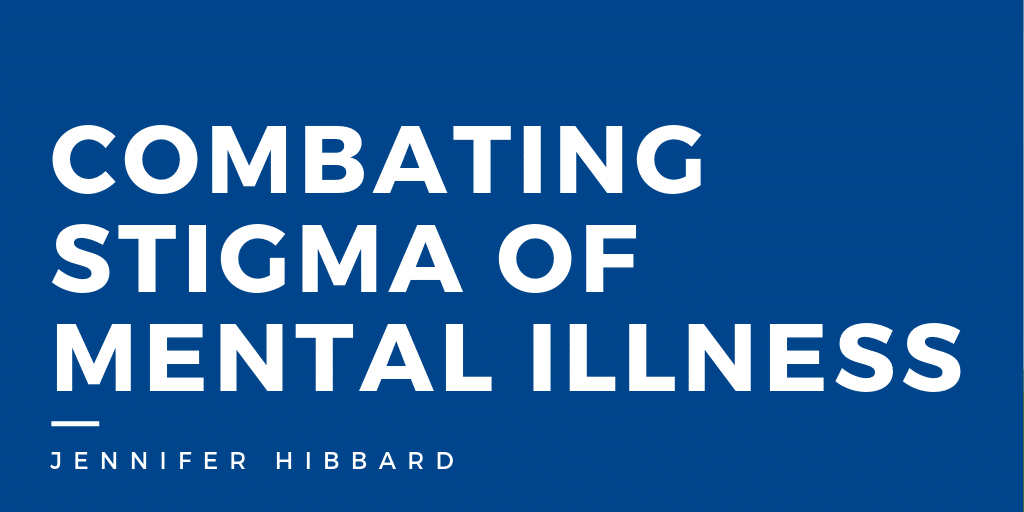Contributed by Jennifer Hibbard, LPC

 For the most part, we take being mentally healthy for granted. We don’t see the impact of symptoms of depression, anxiety or substance abuse on someone’s ability to live their life until the illness is very severe. The National Alliance on Mental Illness (NAMI) defines mental illness as “a condition that impacts a person’s thinking, feeling or mood and may affect his or her ability to relate to others and function on a daily basis. Each person will have different experiences, even people with the same diagnosis.” We don’t think about the services needed to help people with mental illness unless you have tried to access care or helped someone else access care. However, mental health issues are quite common. One in five Americans will experience a mental health issue this year. Of these individuals, two-thirds never seek treatment. Most people who experience symptoms of mental illness struggle alone, in silence as the illness progresses. Early intervention and support can help reduce the duration of untreated symptoms and potentially curb the severity of the illness. In fact, more than half of mental health disorders begin before the age of 24. Unfortunately, less than 20% of young people with a diagnosable mental illness receive the treatment they need. We wouldn’t want to delay access to care for other chronic or debilitating illnesses. So why wait to access services for mental illness?
For the most part, we take being mentally healthy for granted. We don’t see the impact of symptoms of depression, anxiety or substance abuse on someone’s ability to live their life until the illness is very severe. The National Alliance on Mental Illness (NAMI) defines mental illness as “a condition that impacts a person’s thinking, feeling or mood and may affect his or her ability to relate to others and function on a daily basis. Each person will have different experiences, even people with the same diagnosis.” We don’t think about the services needed to help people with mental illness unless you have tried to access care or helped someone else access care. However, mental health issues are quite common. One in five Americans will experience a mental health issue this year. Of these individuals, two-thirds never seek treatment. Most people who experience symptoms of mental illness struggle alone, in silence as the illness progresses. Early intervention and support can help reduce the duration of untreated symptoms and potentially curb the severity of the illness. In fact, more than half of mental health disorders begin before the age of 24. Unfortunately, less than 20% of young people with a diagnosable mental illness receive the treatment they need. We wouldn’t want to delay access to care for other chronic or debilitating illnesses. So why wait to access services for mental illness?
In Georgia, an estimated 1.8 million people suffer from a diagnosable mental illness, and approximately 1.2 million will never seek treatment. The overwhelming reason why individuals do not seek treatment is the negative stigma associated with having mental illness. Stigma sets a person apart by defining them as their illness. Negative attitudes about mental illness create prejudice which leads to negative actions and discrimination. For example, a common misconception or negative attitude is that personality weakness or character flaws cause mental health problems. On the contrary, mental health problems have nothing to do with being weak. Many factors contribute to mental health problems and may include genetic factors, physical illness, injury, brain chemistry, traumatic events and abuse. Stigma creates feelings of isolation and shame for the individual already suffering with symptoms, and these effects of stigma can be as painful as the illness itself.
How can you make a difference? You probably know someone with a mental health problem and don’t even realize it. A helpful, concerned community can make a big difference. Friends and family can be important influences to help someone get the treatment and services they need by letting them know you are available to listen, help them access mental health services, treat them with respect, and do not use derogatory labels such as crazy.
People with mental health issues get better and many recover completely. Individuals are able to live, work, learn, and participate fully in their communities while managing their illness. You can become a champion for mental health! In your day to day interactions, express compassion and be willing to talk openly about mental illness and substance use. If you know someone who may be struggling in silence, offer them support by being willing to listen and help navigate treatment options. Services are available, easily accessible and Recovery IS Possible.
You can go to www.myviewpointhealth.org to access services near you and find helpful resources on the “resources” tab. View Point Health serves uninsured/underinsured, low-income Medicaid, aging/elderly Medicare, war veterans and some private insurance.
 Jennifer Hibbard is a Licensed Professional Counselor who has been with View Point Health for 13 years and currently serves as the CEO. Her past positions within View Point Health include COO, VP of Programs, Director of Quality Assurance, Adolescent Clubhouse Director, Utilization Coordinator, Child and Adolescent Coordinator, and Adult Mental Health clinician. She serves on the Board of Directors for the Gwinnett Coalition of Health and Human Services and as the chair of the Child Sexual Assault Prevention committee and is a member of the Gwinnett Rotary. Jennifer is originally from Texas where she earned her Master’s Degree in Professional Counseling from Southwest Texas State University and Bachelor’s Degree in Psychology from the University of Texas in Austin.
Jennifer Hibbard is a Licensed Professional Counselor who has been with View Point Health for 13 years and currently serves as the CEO. Her past positions within View Point Health include COO, VP of Programs, Director of Quality Assurance, Adolescent Clubhouse Director, Utilization Coordinator, Child and Adolescent Coordinator, and Adult Mental Health clinician. She serves on the Board of Directors for the Gwinnett Coalition of Health and Human Services and as the chair of the Child Sexual Assault Prevention committee and is a member of the Gwinnett Rotary. Jennifer is originally from Texas where she earned her Master’s Degree in Professional Counseling from Southwest Texas State University and Bachelor’s Degree in Psychology from the University of Texas in Austin.
